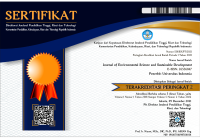Abstract
This research investigates the tenacity of the villagers of Geriana Kauh in the Regency of Karangasem, Bali in preserving their culture and nature. Balinese are facing immediate threats due to massive modernization and industrialization. The excessive and intrusive development generated by mega tourism is causing environmental and societal degradations. People from the small village of Geriana Kauh have been striving to protect their ancestral land with the power of cultural consciousness. For the past 10 years, they have been working to rehabilitate their social and ecological crises caused by modernizations. This research utilizes eco-philosophy theories. The first is post-structuralist three ecologies theory by Felix Guattari. Using this critical theory, authors can extract the importance of equilibrium within the psyche, the social, and the ecological. The second is social ecology theory proposed by Murray Bookchin to understand the formation of a conscious ecological society. The novelty of this research is the amalgamation of local wisdom and religious value as progressive tools to create social-ecological transformation. The Balinese foundation of living lies within the philosophy of Tri Hita Karana or three sources of happiness: harmony among one another (pawongan), within the environment (palemahan), and to God (parahyangan). The villagers of Geriana Kauh live by this philosophy. They are predominantly farmers who have inherited land which has been passed down from generation to generation. This farming tradition is also intertwined alongside the ancient tradition of irrigation or Subak. Cultivating lands has become their cultural and spiritual identities.
References
Baal, J. V. (Ed.). (1969). Bali: Further Studies in Life, Thought, and Ritual. Amsterdam: Royal Tropical Institute.
Bookchin, M. (1982). The Ecology of Freedom. USA: Chesire Books.
http://theanarchistlibrary.org/library/murray-bookchin-the-ecology-of-freedom.a4.pdf
Bardini, T. (1994). A Translation Analysis of the Green Revolution in Bali. Science, Technology, & Human Values, 19(2), 152-168.
https://doi.org/10.1177/016224399401900202
Cavalcante, K. L. (2018). The Ecosophy of Felix Guattari: An Analysis of Philosophy For Environmental Issue. International Journal of Humanities and Social Science Invention, 7(12), 25-28.
https://journals.indexcopernicus.com/search/article?articleId=1872905
Christie, J. W. (2007). Water and Rice in Early Java and Bali. In Peter Boomgaard (Eds.), Rain, Rivers and Seas in Southeast Asian Histories (pp. 235-258). Leiden: Brill.
https://library.oapen.org/bitstream/handle/20.500.12657/34662/376971.pdf?sequence=1#page=244
Cojucaru, M. (2012). Realizing Utopia? Reconstructing Its Normative Potential. RCC Perspectives, (8), 45-56.
https://www.jstor.org/stable/10.2307/26240433
Covarrubias, M. (1973). Island of Bali. Hong Kong: Periplus Classics.
Darta, I. G. N., Couteau, J., & Breguet, G. (2013). Time, Rites, and Festivals in Bali. Indonesia: BAB Publishing.
http://babbooks.com/assets/books/09807d941354dc700ea24c65b1a1f07c.pdf
Davis, M. (2015). (Rep.). Stockholm Environment Institute.
http://www.jstor.org/stable/resrep02790
Dewi, S. (2015). Ekofenomenologi. Tangerang Selatan: Marjin Kiri.
Dewi, S. (2017, July 5). Menjemput Sang Bidadari. National Geographic.
https://nationalgeographic.grid.id/read/13278213/menjemput-sang-bidadari
Dibia, I. W. & Ballinger, R. (2004). Balinese Dance, Drama & Music. Hong Kong: Tuttle Publishing.
https://www.tuttlepublishing.com/books-by-country/balinese-dance-drama-music
Guattari, F. (1989). The Three Ecologies. London: Bloomsbury Academics.
https://monoskop.org/images/4/44/Guattari_Felix_The_Three_Ecologies.pdf
Guattari, F. (1992). Chaosmosis An Ethico-Aesthetic Paradigm. USA: Indiana University Press.
https://monoskop.org/images/2/24/Guattari_Felix_Chaosmosis_An_Ethico-Aesthetic_Paradigm.pdf
Gunawan, D. H. (2014). Perubahan Sosial di Pedesaan Bali. Tangerang Selatan: Marjin Kiri.
https://marjinkiri.com/product/perubahan-sosial-di-pedesaan-bali-dualitas-kebangkitan-adat-dan-demokrasi-lokal/
Hauser-Schäublin, B. (2004). The Politics of Sacred Space; Using Conceptual Models of Space For Socio-Political Transformations in Bali. Journal of the Humanities and Social Sciences of Southeast Asia, 160(2), 283-314.
https://doi.org/10.1163/22134379-90003728
Horkheimer, M. & Adorno, T. W. (2002). Dialectic of Enlightenment. USA: Stanford University Press.
Lansing, S. (2007). Priests and Programmers, Technologies of Power In The Engineered Landscape of Bali. New Jersey: Princeton University Press.
https://press.princeton.edu/books/paperback/9780691130668/priests-and-programmers
Lansing, S. (2012). Perfect Order. New Jersey: Princeton University Press.
https://books.google.co.id/books?id=f6H-kCvCCwgC&redir_esc=y
Lansing, J. S., & Thérèse, T. A. (2012). The functional role of Balinese water temples: A response to critics. Human Ecology, 40(3), 453-467.
https://link.springer.com/content/pdf/10.1007/s10745-012-9469-4.pdf
Mahendra, A (2017). Dokumentasi merupakan hak milik Museum Sang Hyang Dedari, Karangasem, Bali. Sang Hyang Dedari.
https://sanghyangdedari.org/
Mawangi, G. (2016, August 1). Tari Sang Hyang Dedari Selamatkan Sawah Bali. Antara News. http://www.antaranews.com/berita/576270/tari-sang-hyang-dedari-selamatkan-sawah-bali
Picard, M. (2006). Bali Pariwisata Budaya dan Budaya Pariwisata. Jakarta: Kepustakaan Populer Gramedia.
Putri, L., Mawangi, G., & Utami, P. (2014). Aspek Sakral dan Sihir Dalam Tarian Sang Hyang Dedari: Suatu Analisa Fenomenologis Mengenai Tubuh Di Dalam Tarian. Sang Hyang Dedari.
https://sanghyangdedari.org/laporan-akhir-hibah-riset-awal-fakultas-ilmu-pengetahuan-budaya-ui/
Reuter, T. A. (Ed.). (2005). Inequality, Crisis And Social Change in Indonesia. UK: Taylor & Francis e-Library.
Salamanca, A., & Nguyen, H. (2016). (Rep). Climate Change Adaptation Readiness in the ASEAN Countries. Stockholm Environment Institute.
https://www.jstor.org/stable/resrep02771
Sunarta, I. N., & As-syakur, A. R. (2015). Study on The Development of Water Crisis in Bali Island in 2009 and 2013. E-Jounal of Tourism, 2(1), 33-42.
https://ojs.unud.ac.id/index.php/eot/article/view/19441
Vickers, A. (1996). Bali, A Paradise Created. Hong Kong: Periplus Editions.
Vickers, A. (2012). Bali Tempo Doeloe. Depok: Komunitas Bambu.
https://books.google.co.id/books/about/Bali_tempo_doeloe.html?id=bTdkMwEACAAJ&redir_esc=y
Wardana, A. (2019). Contemporary Bali, Contested Space and Governance. Singapore: Palgrave Macmillan.
https://www.palgrave.com/gp/book/9789811324772
Windia, W. (2013). Penguatan Budaya Subak Melalui Pemberdayaan Petani. Jurnal Kajian Bali, 2(2), 137-158.
https://ojs.unud.ac.id/index.php/kajianbali/article/view/15678
Recommended Citation
Putri, LG. Saraswati
(2020).
THE PERSISTENCE OF AN ECOLOGICAL SOCIETY: IN-DEPTH CRITICAL ANALYSIS OF THE COMMUNITY MOVEMENT IN GERIANA KAUH, KARANGASEM.
Journal of Environmental Science and Sustainable Development, 3(1), 142-155.
Available at: https://doi.org/10.7454/jessd.v3i1.1030






